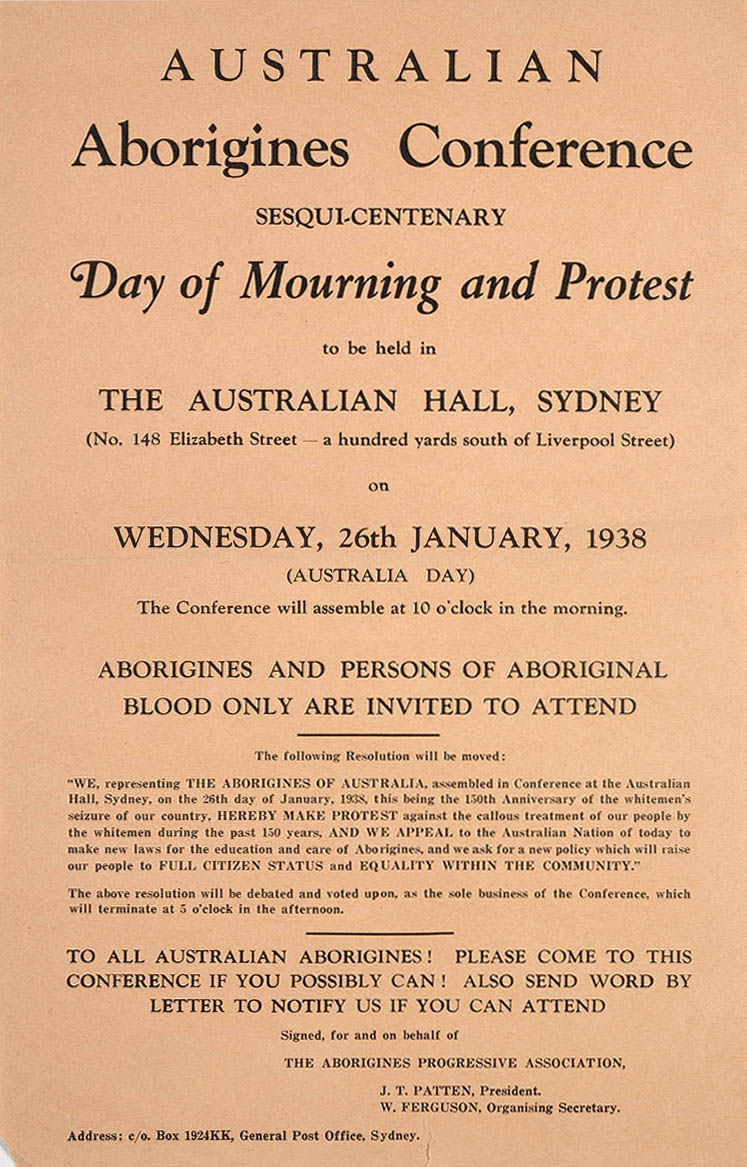The Dictionary of Sydney was archived in 2021.
Aborigines Progressive Association
Citation
Persistent URL for this entry
To cite this entry in text
To cite this entry in a Wikipedia footnote citation
To cite this entry as a Wikipedia External link
Aborigines Progressive Association
The Aborigines Progressive Association was launched by William Ferguson in 1937. Ferguson had links with the Australian Aborigines' League of Victoria, which joined with the Australian Aborigines Progressive Association to create a petition to King George V, calling for the return of Aboriginal reserve lands to their traditional owners. After touring regional New South Wales collecting signatures for this petition, Ferguson made a public call for a Parliamentary Select Committee enquiry into the administration of the New South Wales Aborigines' Protection Board. The inquiry commenced in November 1937 but it was never completed.
Day of Mourning conference
[media]By this stage, Ferguson had linked up with activist Pearl Gibbs, and with Jack Patten, who became president of the newly formed Aborigines Progressive Association. In response to the dissolution of the Parliamentary Select Committee and the approaching celebrations associated with the sesquicentenary of European invasion, the association collaborated with the Australian Aborigines' League to organise a Day of Mourning conference for 26 January 1938. Unable to hire the Sydney Town Hall, they were able to secure Australian Hall in Elizabeth Street for the conference.
Access to the conference was restricted to Aboriginal people – the handbill promoting the day read: 'Aborigines and Persons of Aboriginal Blood only are invited to attend. Please come if you can!' [1] On the day, over 100 people attended, with only two non-Aboriginal participants, who were members of the press. [2] There were two police officers stationed at the front door of Australian Hall and many of the delegates entered through the back entrance in Nithsdale Street to avoid being identified, afraid they would be victimised by police for attending. [3]
[media]The conference endorsed the following statement:
WE, representing THE ABORIGINES OF AUSTRALIA, assembled in Conference at the Australian Hall, Sydney, on the 26th day of January, 1938, this being the 150th Anniversary of the whitemen's seizure of our country, HEREBY MAKE PROTEST against the callous treatment of our people by the whitemen during the past 150 years, AND WE APPEAL to the Australian Nation of today to make new laws for the education and care of Aborigines, and we ask for a new policy which will raise our people to FULL CITIZEN STATUS and EQUALITY WITHIN THE COMMUNITY. [4]
Call for citizenship and equality
By the end of 1938 the organisation had split into two, with Patten heading one faction and Ferguson the other. [5] Annual conferences were arranged for the next four years by Ferguson and Gibbs. Despite the split, both factions worked towards the abolition of the New South Wales Aborigines Protection Act , 1909. They also called for full citizenship rights and attempted to secure Aboriginal representation in parliament. The main platform of the association was assimilationist, [6] arguing for the recognition of Aboriginal people as equals to the wider Australian community, and emphasising the need for integration.
The Aborigines Progressive Association also met with the Prime Minister, Joseph Lyons, to present a manifesto of 10 national reforms. [7]
The association was active until 1944 and was momentarily revived in 1966, when Aboriginal activists broke away from the constitutional agenda of the Aboriginal-Australian Fellowship, keen to agitate around land rights. [8]
Notes
[1] W Ferguson and JT Patten, 'Aborigines Claim Citizen Rights! A Statement of the Case for the Aborigines' Progressive Association', The Publicist, 1938
[2] Stephanie Gilbert, 'Never Forgotten: Pearl Gibbs (Gambanyi)', in Anna Cole, Victoria Haskins and Fiona Paisley (eds), Uncommon Ground: White Women in Aboriginal History, Aboriginal Studies Press, Canberra, 2005, p 111
[3] New South Wales Heritage Office, 'New South Wales Aborigines' Progressive Association and the Australian Hall', in Assessing Historical Association, Heritage Information Series, Heritage Office of New South Wales, Parramatta, 2000
[4] W Ferguson and JT Patten, 'Aborigines Claim Citizen Rights! A Statement of the Case for the Aborigines' Progressive Association', The Publicist, Sydney, 1938
[5] Bain Attwood and Andrew Markus, The Struggle for Aboriginal Rights: A Documentary History, Allen & Unwin, Sydney, 1999, p 59
[6] Russell McGregor, 'Protest and Progress: Aboriginal Activism in the 1930s', Australian Historical Studies, no 101, October 1993, p 555
[7] Jack Horner, 'Steadfast Pioneers', Identity, July 1972, pp 10–11
[8] National Museum of Australia, Canberra, 'Aborigines Progressive Association', in Collaborating for Indigenous Rights website, HYPERLINK "http://www.indigenousrights.net.au/organisation.asp?oID=30" http://www.indigenousrights.net.au/organisation.asp?oID=30, viewed 20 June 2008
.




